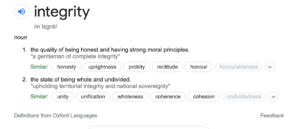What is to act with integrity?
Why play by the rules?
Why let ethics make a hard task even harder?
No one seems to care, why should we?
Should profitability not come before proprietary?
We’re too small for such high ideals, don’t you think?
Survival comes first, we will see, what to do with such ‘nice’ things later, now is not the time.
We have to live today to fight another day.
And many more.
The realisation that ‘integrity is still largely considered ‘optional’ speaks for itself. Don’t get me wrong, I am not saying people consider talking in favour of the virtue ‘optional’. We speak about it all the time: from boardrooms to board games. It is in ‘practice’ where we find inconsistencies and that is what we are attempting to uncover, today. Organisations big and small brag of being culturally superior to their competitors without batting an eyelid. You look up at the value section on the websites of any organization of any sector of your choice – you are likely to find integrity there in 8 out of 10 cases and yet a vast majority of their staff fake one or more of the below, listed items in filing for their returns.
- Medical bills
- HRA (Rental)
- LTA
- Shoddy Loans statements.
What does it say about us? Why do we not come out in the open and proclaim that we are petty cheats, that we willingly lie on oath (a signature saying the information that you’ve furnished is correct is indeed an oath), to save a few bucks? Why do people extent each other the courtesy of looking the other way, in the corporate setups? Why some form of wrong is considered less wrong than the other? If it is practised so widely, why don’t we recognise it formally as an admissible norm?
Reluctance in social acceptance of such practices, gives away, the most fundamental truth: that there is no confusion on the definition, whatsoever. Everyone knows what is the right thing to do. So in that sense, propagation of the ideal has been fine, we as a society can pat ourselves on our backs for it. Why does practice fall short, though? Is financial weakness the sole reason for widespread corruption? Or is the root of the problem deeper. It is a complicated and complex matter, it is as much societal as it is personal as much moral as practical as much important as inherent. Our character is shaped by the slab of stories that we hear as a child and by what we witness happening around us. We pick both good and the bad from our immediate surrounding, and then a fuller version of the idea that we believe to be better constitutes our character. Accord me the liberty to take you to a common story that is a part of the childhood of a vast majority of living souls.
The story of Robin Hood; the guy who steals/robs from the rich and distributes the loot among the poor. He is hailed by the common man and hated by the rich and the powerful. The establishment leaves no stone unturned in hunting for him and common people let nothing come in the way of their desire to hide him, to side with him. It is a fascinating story, which has a number of layers, which we can use, to further our argument. Let’s go over them one by one.
Stealing is glorified as long as it is not done to serve self-interest (Robin does not steal for himself, alone).
Charitable intent seems to sanitise what is clearly an illegal act. Take a closure look you’d find that morality trumps legality, in this case. Because it is noble to help the poor the criminal act of stealing is excused. Popular opinion is shaped around ‘heroics and courage’; don’t take my word for it, conduct your own little research and you’d find that irrespective of the era and geography someone brave is fighting the mighty for the rights of those who can’t fight for themselves. In the process, the protagonist kills, lies, cheats and whatnot but, but all his means are relegated to the footnote of history. What remains in the front and centre of annals is the fact that brave X helped poor Y by fighting the mighty, evil and wealthy Z.
In the modern world, however, the scope for a horse riding lone hero is scant. So society normalises tax evasion to save anything between 5% to 20% of the earning, in absolute value the amount could be a few thousand for one and crores for another; depending on who is scooping from the plate of the government. Society suffering from the Robinhood complex obliges to make it chastely, it paints the Government as a cruel force. To propagate by implication that it is ok to steal from the state, which is inherently dishonest and self-serving.
Distribution of the loot among the poor washes the immoral stain of stealing from it. The underlying assumption here is that the rich have exploited the poor to become accumulate property. Which may or may not be true. Not every person of wealth is a crook and not every popper is proper; such generalisation is as misguided as saying that every Muslim is a terrorist because a few Arabic names have been associated with nefarious acts of terror. Let’s blow the cover of morality here, by saying that the size of the loot does little to its legitimacy, all stealing is corrupt and must not be done. A salaried man steals all that he can keep, that is his Med bills, LTA claims and odd insurance claims, some creatives jesters even bring in loans in the mix. On the other side of the spectrum, the bent politician, as the popular belief goes, lifts in hundreds of crores. A crore is certainly more than a few thousand; but here we need to see that both, an average man and the politician stripped all that they could. And if you look at it, they are stealing from one another in an endless loop. We steal from tax and the politician bags from that, which goes around in the cycles of funny economics. Much like the air that we breathe has once also gone through the nostrils of Bapu, the rupee that we kept at some point has also been in the cupboard of a corrupt Government official and by extension a politician too.
Social and economic inequality legitimises hurting the rich and the powerful elite.
There is no denying that economic and social inequality is a product of policy more than the choices that an individual makes as often the universe of possibilities is controlled by the policy itself. It is also equally true that the greed of some has resulted in the misery of many and that this is the work of millenniums and not just a few generations. But what we can’t also rule out that, those who acquired inordinate wealth some 400 years ago in their lineage did something different from those who do not have it, today. The haves and the have nots do make different choices every day. It is true that in modern democracies it is the prime responsibility of the state to ensure that through administrative intervention this gap is reduced. Levelling of the field is a work in progress, since independence we have made major gains in that endeavour. But, can we actually take cover in widespread inequality to say that we steal because someone else is better off? The honest to God truth is that we steal because we think we can and in that those who do the stealing at a much larger scale are no different from us, they also plunder because they can.
The act of robbing, (a metaphor for every form of wrong) alone is neither good nor bad, it becomes one or the other based on the ‘motive’ of the act and what is done with it after the loot.
Ends do not justify the means, Bapu has demonstrated it to the world with great eloquence and transparency. I do not think I have either the capability or the courage to add even a dot to it. The best that I can do is borrow from him to say that, imagine a world in which everyone did not care about the ‘means’ in an arbitrary degree; how will then the resulting world look like? Won’t ‘might’ become right, much like in the animal kingdom, in which every argument of the tiger will always be correct and the goat will invariably be on the wrong side? We have to admit that there is no right reason for doing the wrong thing.
I do not know how to say this without sounding facetious: dishonesty is rewarded in corporate settings, blatantly. You might find this remark immoderate even disagreeable, but I implore you to indulge me.
Here are a few common precedents.
- ‘Ability to spin’ is preferred over ‘detailed insight’ and ‘truthful confessions’ in review meetings with the clients.
- Scheme/offer that deceivingly hides the ‘truth’ (true cost to the customer) is considered ‘smart’.
- Speculative exaggeration is not just an accepted but also an honoured sales practice; though it is pure lying.
Think about it, have you unknowingly encouraged such traits?
If so, you do not need me to tell you what is the right thing to do.
Disliking corruption will not free society from it, purification will begin, when we start acting collectively in the interest of integrity, disregarding the proposition of personal gains.
Think, about areas in which you can make a change today to create a better society and then make it.
We do not need Robinhoods as much as we need ordinary and honest Robins to prevail.
Good luck and take care.


